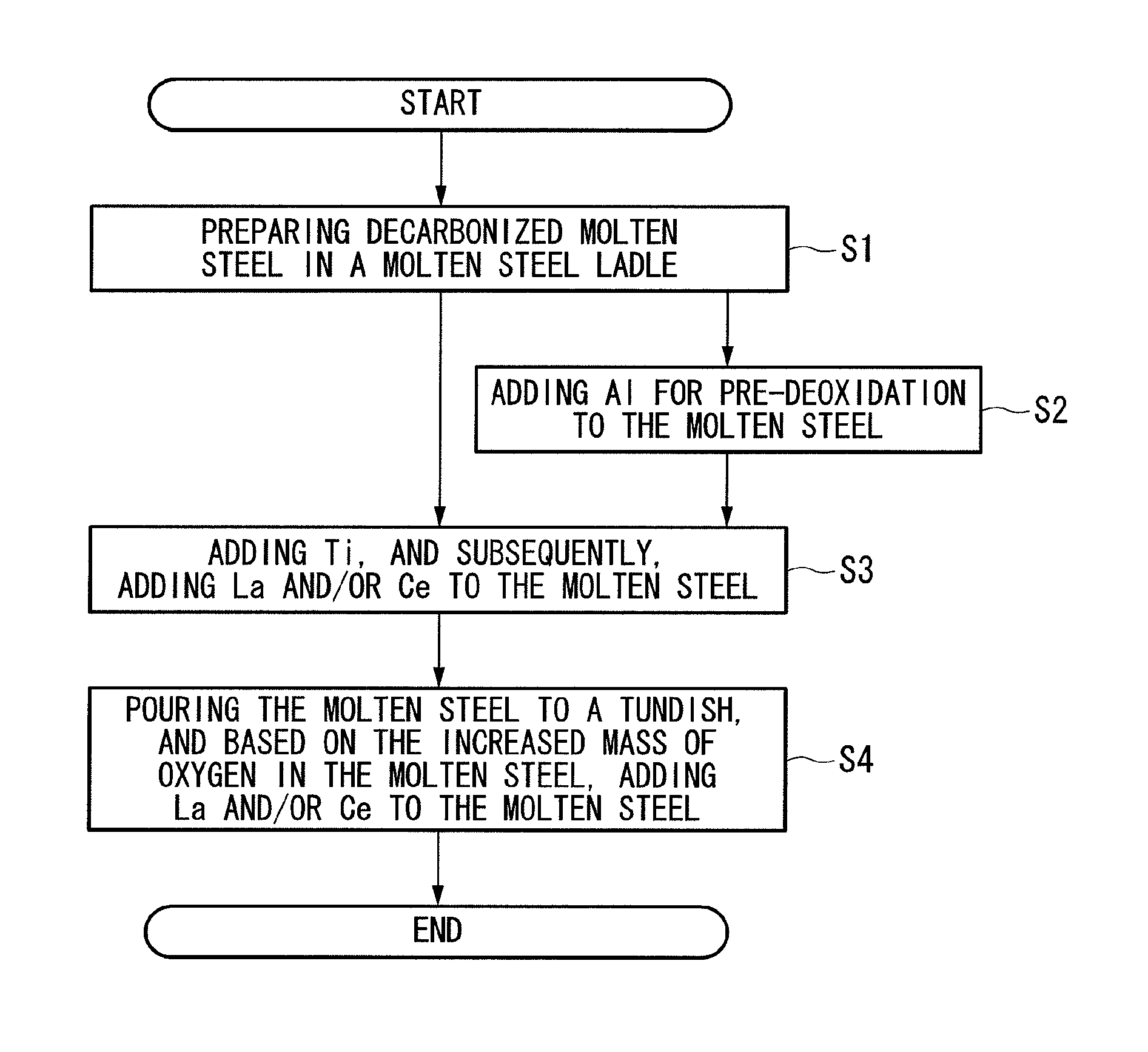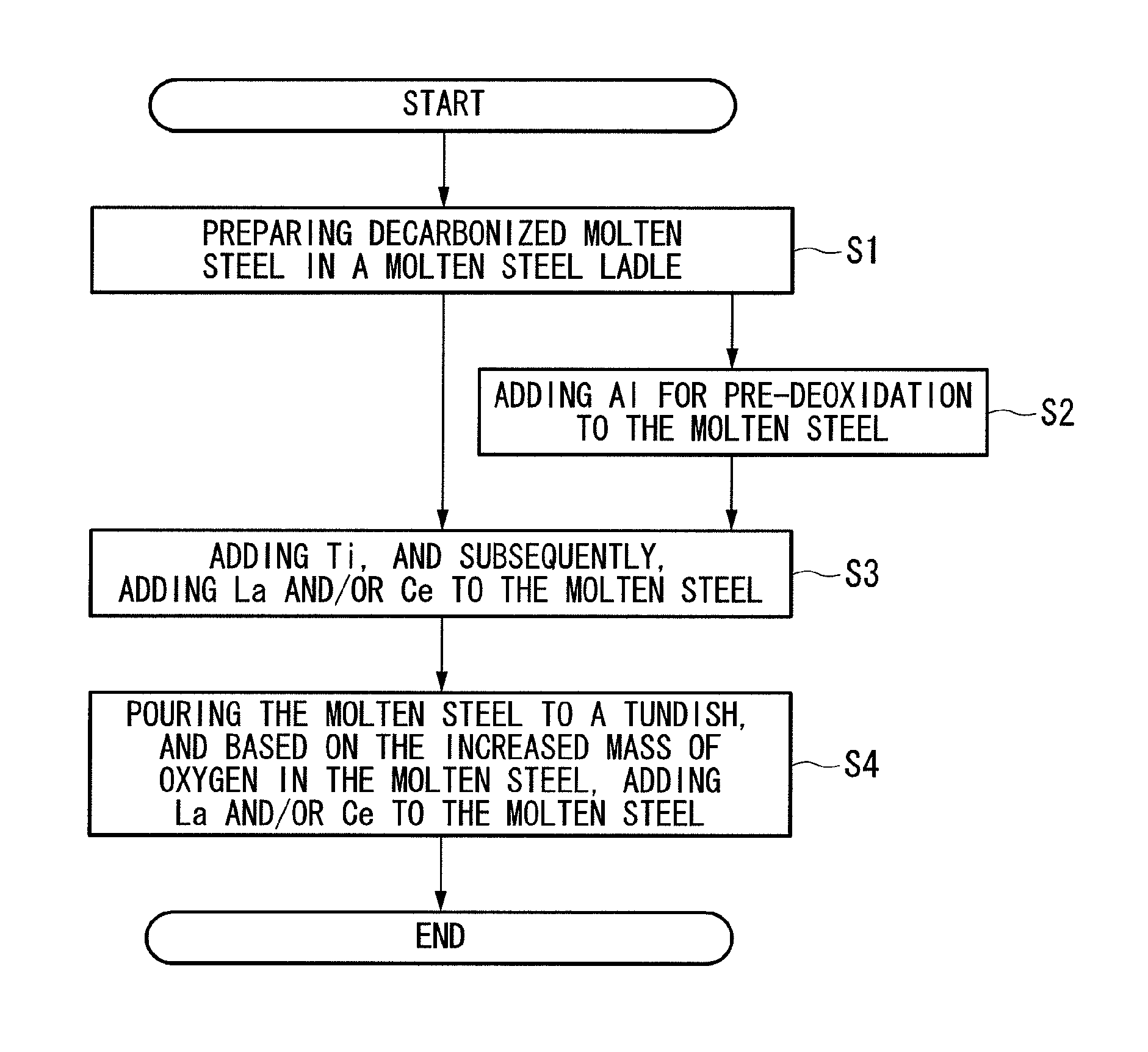Low-carbon steel slab producing method
a low-carbon steel and slab technology, applied in the field of low-carbon steel slab production methods, can solve the problems of affecting continuous casting operation, high concentration of dissolved oxygen after refining, and excessive amount of molten steel refined in the converter furnace and/or in the vacuum processing container, so as to achieve excellent workability and moldability, prevent nozzle clogging and product surface defects, and aggregate with relative ease
- Summary
- Abstract
- Description
- Claims
- Application Information
AI Technical Summary
Benefits of technology
Problems solved by technology
Method used
Image
Examples
example 1
[0070]300 tons of molten steel containing 0.0013 mass % of C, 0.004 mass % of Si, 0.25 mass % of Mn, 0.009 mass % of P, and 0.006 mass % of S was produced through refining in a converter furnace and process in an RH degasser, and was prepared in a ladle (S1 in FIG. 1). After adding Ti to the molten steel, La and Ce were added thereto (S3 in FIG. 1). Then, molten steel containing 0.053 mass % of Ti, 0.0007 mass % of La, 0.0005 mass % of Ce, and 0.0046 mass % of oxygen was obtained.
[0071]The molten steel in the ladle was taken as a sample for studying inclusions. Then, it was found that there existed inclusions in spherical shape or spindle shape having a diameter of 0.5 μm-30 μm. Further, all of the inclusions were oxides consisting of TiO2, La2O3, and Ce2O3, and the modification indexes of these inclusions fall within a range of 0.16 or more and 0.58 or less.
[0072]From the ladle, the molten steel in the amount of 4.4 tons per a minute was poured into casting molds via a tundish, usi...
example 2
[0077]300 tons of molten steels respectively containing 0.0013 mass % of C, 0.004 mass % of Si, 0.25 mass % of Mn, 0.009 mass % of P, 0.006 mass % of S were produced through refining in a converter furnace and process in an RH degasser, and were respectively prepared in a first ladle and a second ladle (S1 in FIG. 1). Then, to each of the ladles containing the molten steel, 100 kg of Al for pre-deoxidation was added and refluxed for three minutes, thereby obtaining molten steel containing 0.002 mass % of Al and 0.012 mass % of oxygen (S2 in FIG. 1).
[0078]Further, to each of the molten steels, 200 kg of Ti was added and refluxed for one minute, and subsequently, 40 kg of Ce was added to the first ladle, and 40 kg of La was added to the second ladle (S3 in FIG. 1). Then, molten steels containing 0.033 mass % of Ti and 0.01 mass % of oxygen, which further contain La or Ce in the concentration of 0.005 mass % were obtained.
[0079]Each of the molten steels in the ladles was taken as a sam...
PUM
| Property | Measurement | Unit |
|---|---|---|
| mass ratio | aaaaa | aaaaa |
| thickness | aaaaa | aaaaa |
| thickness | aaaaa | aaaaa |
Abstract
Description
Claims
Application Information
 Login to View More
Login to View More - R&D
- Intellectual Property
- Life Sciences
- Materials
- Tech Scout
- Unparalleled Data Quality
- Higher Quality Content
- 60% Fewer Hallucinations
Browse by: Latest US Patents, China's latest patents, Technical Efficacy Thesaurus, Application Domain, Technology Topic, Popular Technical Reports.
© 2025 PatSnap. All rights reserved.Legal|Privacy policy|Modern Slavery Act Transparency Statement|Sitemap|About US| Contact US: help@patsnap.com


